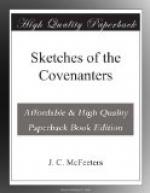* * * * *
Points for the class.
1. Why does God send trials upon His Church?
2. Mention some of the fluctuations in the Church’s condition.
3. What class of ministers then had the ascendancy?
4. How did the faithful ministers suffer?
5. What became the test for the pastorate?
6. What faithful young minister declined the test?
7. What was Alexander Henderson’s experience?
8. Explain the responsibility of ministers.
XI.
The advance guards.—A.D. 1630.
King James VI. continued his warfare against Presbyterianism until his death. This occurred March 27, 1625. With advancing years he grew more bitter, using every means to coerce the Covenanters and bring them into submission. They stood as a wall of fire between him and his cherished ambition to rule supreme over Church and State. He resolved to break down that wall and quench that fire.
Covenanted Presbyterianism has always stood for liberty, conscience, enlightenment, progress, and exalted manhood, resisting all tyrants and oppressors. Presbyterianism recognizes as the crowning glory of man, his relation to God, all men alike being subjects of His government and accountable at His throne; all being under law to God and under law to no man, except in the Lord. Presbyterianism honors every honest man as a real king, clothed with innate majesty, crowned with native dignity, and exalted far above the conventional office of earth’s highest monarch. Yet does Presbyterianism sustain all rightful rulers as ministers of God, and enjoin upon all people submission in the Lord.
In the beginning of 1625, while the snow was yet mantling the mountains in white, the symbol of moral purity and goodness, the king was grimly planning to debase and corrupt the best people in his realms. He gave orders to celebrate Easter with a Communion according to the Articles of Perth, announcing a severe penalty against all who would not comply. The decree was not enforced, for the Lord came suddenly to the unhappy monarch, saying, “Thy soul is required of thee.” Easter came with its soft winds and opening buds, its singing brooks and flowery nooks, but King James was not there; the Judge had called him, death had conquered him, the grave had swallowed him; his miserable life was broken off under sixty years of age; and after death, eternity; the long, long eternity.
His Son, Charles I., inherited the father’s troubled kingdom, despotic principles, and wilful doggedness. The young ruler began his reign by breathing out threatenings against the Covenanters. Yet the Lord in many ways strengthened His people. He gave them at this time some remarkable Communions and memorable seasons of refreshing. He pitied them for they were nearing the fiery trials that would try their faith to the utmost. To prepare them for the testing times. He led them up into the mountain of His loving favor and gave them another memorable privilege of renewing their Covenant.




